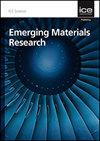The effects of Zn doping on the thermoelectric performance of Cu12Sb4S13
IF 1.2
4区 材料科学
Q4 MATERIALS SCIENCE, MULTIDISCIPLINARY
引用次数: 1
Abstract
We used first-principles electronic structure calculations and Boltzmann transport theories to understand the thermoelectric behavior of tetrahedrites. We performed calculations on the Zn substituted derivatives with Zn occupied each lattice site in the parent compound Cu12Sb4S13, to study Zn substitution mechanism, and the relation between Zn substitution site and thermoelectric performance. We found that the most energetically favorable sites for Zn is the Cu(1) sites, and the next is the Cu(2) sites. And the room-temperature Seebeck coefficient of the host was enhanced nearly 255 and 7 times by Zn doping at Cu(1) and Cu(2) sites, owing to the decrease of carrier concentration and the increase of band effective mass, respectively. However, the electrical conductivity showed a marked decrease upon Zn doping at Cu(1) and Cu(2) sites, due to the decrease in carrier contribution and low mobility, respectively. As a result, the Cu12Sb4S13 compounds substituted with Zn at Cu(1) sites have a preferable optimizing power factor at room temperature. The optimizing power factor of the host could get an about 8-time improvement at room temperature upon Zn substituting at Cu(1) sites.Zn掺杂对Cu12Sb4S13热电性能的影响
我们使用第一性原理电子结构计算和玻尔兹曼输运理论来理解四面体的热电行为。我们对母体化合物Cu12Sb4S13中每个晶格位都被Zn占据的Zn取代衍生物进行了计算,研究了Zn取代机理以及Zn取代位与热电性能的关系。我们发现对Zn能量最有利的位是Cu(1)位,其次是Cu(2)位。Cu(1)位和Cu(2)位掺杂Zn后,寄主的室温Seebeck系数分别提高了近255倍和7倍,这是由于载流子浓度的降低和能带有效质量的增加。然而,在Cu(1)和Cu(2)位点掺杂Zn后,由于载流子贡献的减少和迁移率的降低,电导率明显降低。结果表明,在室温条件下,以Zn取代Cu(1)位的Cu12Sb4S13化合物具有较好的优化功率因数。室温条件下,Zn取代Cu(1)后,优化后的基质功率因数可提高约8倍。
本文章由计算机程序翻译,如有差异,请以英文原文为准。
求助全文
约1分钟内获得全文
求助全文
来源期刊

Emerging Materials Research
MATERIALS SCIENCE, MULTIDISCIPLINARY-
CiteScore
4.50
自引率
9.10%
发文量
62
期刊介绍:
Materials Research is constantly evolving and correlations between process, structure, properties and performance which are application specific require expert understanding at the macro-, micro- and nano-scale. The ability to intelligently manipulate material properties and tailor them for desired applications is of constant interest and challenge within universities, national labs and industry.
 求助内容:
求助内容: 应助结果提醒方式:
应助结果提醒方式:


